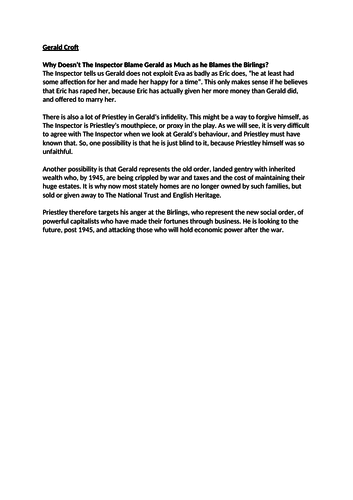

This is a really in depth analysis of Gerald, and you will see him differently after you have read it. Your students will have a completely new perspective.
Here is an extract to show you what I mean:
Gerald’s Affair with Daisy Renton
Although Sheila is the first to expose Gerald’s affair at the start, the language they both use strongly hints that she will forgive him after breaking off the engagement and that, after the end of the play, they will marry.
Gerald’s first impulse is to lie, because Priestley wants to present all capitalists as hypocrites. He denies knowing any “Eva Smith”. Sheila points out that she knows he is simply using his intelligence to maintain a veneer of honesty, as he knew her as “Daisy Renton”. This is called sophistry – using clever arguments which appear true but which the speaker knows to be false.
Although Sheila insists on the truth, her language is also a kind of sophistry. She uses euphemism. Instead of asking for how long he had sex with Daisy, she only insists he “knew her very well”. This is important, as while she is at her most angry now, her own language minimises what he has done. This will make it much easier for her to forgive him in the future. Clever as he is, Gerald picks up on this weakness in her resolve, calling her “darling” in order to manipulate her.
He immediately asks her to keep the affair secret from The Inspector. This might seem astonishingly arrogant. However, Priestley is again showing the corruption of the patriarchy. He expects a woman to protect him even at the expense of her own happiness, in return for the financial security and status that marriage to him will offer her.
Get this resource as part of a bundle and save up to 67%
A bundle is a package of resources grouped together to teach a particular topic, or a series of lessons, in one place.
Something went wrong, please try again later.
Report this resourceto let us know if it violates our terms and conditions.
Our customer service team will review your report and will be in touch.